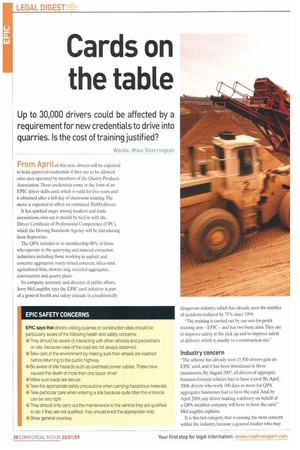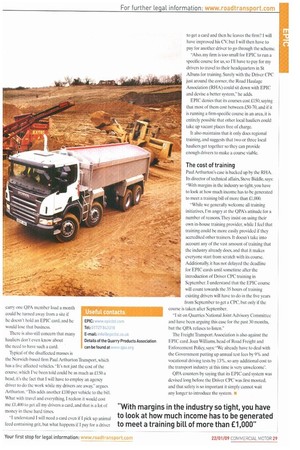Cards on the table
Page 28

Page 29

If you've noticed an error in this article please click here to report it so we can fix it.
Up to 30,000 drivers could be affected by a requirement for new credentials to drive into quarries. Is the cost of training justified?
Words: Mike Sherrington From April of this year, drivers will be expected to hold approved credentials if they are to be allowed onto sites operated by members of the Quarry Products Association. These credentials come in the form of an EPIC driver skills card, which is valid for five years and is obtained after a full day of classroom training. The move is expected to affect an estimated 30,000 drivers.
It has sparked anger among hauliers and trade associations, who say it should be tied in with the Driver Certificate of Professional Competence (CPC), which the Driving Standards Agency will be introducing from September.
The QPA includes in its membership 90% of firms who operate in the quarrying and mineral extraction industries, including those working in asphalt and concrete aggregates, ready mixed concrete. silica sand, agricultural lime, mortar, slag, recycled aggregates, construction and quarry plant.
Its company secretary and director of public affairs, Jerry McLaughlin, says the EPIC card initiative is part of a general health and safety crusade in a traditionally dangerous industry, which has already seen the number of accidents reduced by 75% since 1999.
"The training is carried out by our not-for-profit training arm — EPIC — and has two basic aims, They are to improve safety at the pick up and to improve safety at delivery, which is usually to a construction site."
Industry concern
"The scheme has already seen 15,500 drivers gain an EPIC card, and it has been introduced in three instalments. By August 2007, all drivers of aggregate business-liveried vehicles had to have a card. By April 2008, drivers who work 100 days or more for QPA aggregates businesses had to have the card. And, by April 2009, any driver making a delivery on behalf of a QPA member company will have to have the card," McLaughlin explains.
It is this last category that is causing the most concern within the industry, because a general haulier who may
can-y one QPA member load a month could be turned away from a site if he doesn't hold an EPIC card, and he would lose that business.
There is also still concern that many hauliers don't even know about the need to have such a card.
Typical of the disaffected masses is the Norwich-based firm Paul Arthurton Transport, which has a five affected vehicles. "It's not just the cost of the course, which I've been told could he as much as £150 a head, it's the fact that I will have to employ an agency driver to do the work while my drivers are away," argues Arthurton."This adds another £100 per vehicle to the bill. What with travel and everything, I reckon it would cost me £1,400 to get all my drivers a card, and that is a lot of money in these hard times.
"I understand I will need a card even if I pick up animal feed containing grit, but what happens if I pay for a driver to get a card and then he leaves the firm? I will have improved his CV, hut I will then have to pay for another driver to go through the scheme.
"Also, my firm is too small for EPIC to run a specific course for us, so Ill have to pay for my drivers to travel to their headquarters in St Albans for training. Surely with the Driver CPC just around the corner, the Road Haulage Association (RHA) could sit down with EPIC and devise a better system." he adds.
EPIC denies that its courses cost 1150, saying that most of them cost between £50-70, and if it is running a firm-specific course in an area, it is entirely possible that other local hauliers could take up vacant places free of charge.
It also maintains that it only does regional training, and suggests that two or three local hauliers get together so they can provide enough drivers to make a course viable.
The cost of training
Paul Arthurton's case is backed up by the RHA. Its director of technical affairs, Steve Biddle, says: With margins in the industry so tight, you have to look at how much income has to be generated to meet a training bill of more than £1,000.
"While we generally welcome all training initiatives, I'm angry at the QPA's attitude for a number of reasons.They insist on using their own in-house training provider, while I feel that training could be more easily provided if they accredited other trainers. It doesn't take into account any of the vast amount of training that the industry already does, and that it makes everyone start from scratch with its course. Additionally, it has not delayed the deadline for EPIC cards until sometime after the introduction of Driver CPC training in September. I understand that the EPIC course will count towards the 35 hours of training existing drivers will have to do in the five years from September to get a CPC, but only if the course is taken after September.
"I sit on Quarries National Joint Advisory Committee and have been arguing this case for the past 30 months, but the QPA refuses to listen."
The Freight Transport Association is also against the EPIC card. Joan Williams. head of Road Freight and Enforcement Policy, says: "We already have to deal with the Government putting up annual test fees by 9% and vocational driving tests by 13%. so any additional cost to the transport industry at this time is very unwelcome'.
OPA counters by saying that its EPIC card system was devised long before the Driver CPC was first mooted, and that safety is so important it simply cannot wait any longer to introduce the system. •
















































































































































